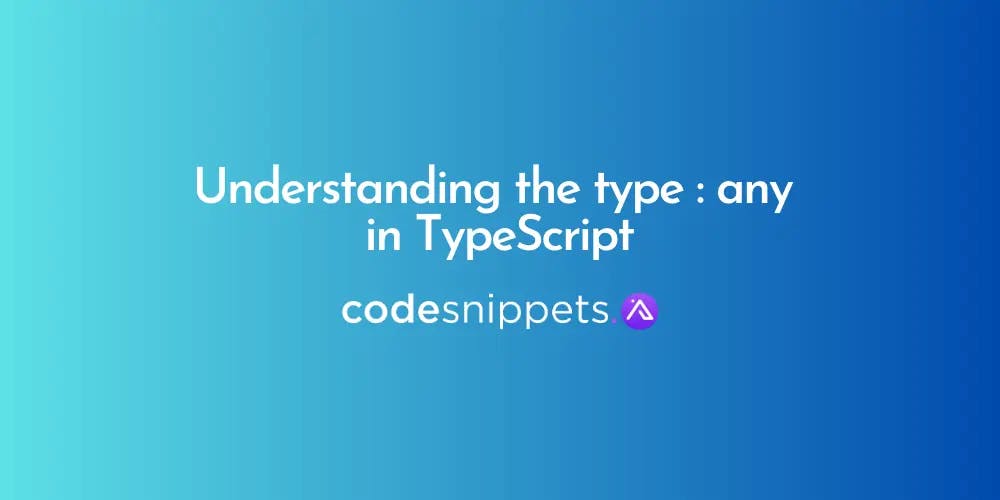LatestUnderstanding the type any in TypeScript
In the TypeScript programming language, the 'any' type signifies a unique type portraying any form of data.

In the TypeScript programming language, the 'any' type signifies a unique type portraying any form of data.
If you use variables or parameters designated as 'any', they assume and can be designated arbitrary values, including integers, string-based data, configurable objects, and other types established by the user.
The singular predicament of 'any' becomes clear when compared to tailored TypeScript types such as integers and strings, which are explicitly regulated to store particular value types. The 'any' type finds extensive utility where the particular type of value remains unpredictable during the compiling process or when one is managing data-driven or untyped information.
TypeScript and 'Any'
Why is the 'any' type in TypeScript potentially hazardous?
The primary issue with utilizing the 'any' type in TypeScript revolves around the disability of type validation, one of the vital gifts TypeScript showers upon us. When 'any' is employed as a type, the compiler overlooks potential inconsistencies or errors due to mismatched or wrongly assigned types, which can spawn difficult-to-trace bugs and type conflicts in your code.
Moreover, this disregards one of the core advantages of TypeScript - the capacity to detect and tackle type-related issues early in the development process, making your codes significantly safer. Incessant abuse of 'any' can result in decreased code readability and complicated maintenance procedures.
Essentially, rampant use of 'any' transforms TypeScript to JavaScript, defeating the purpose of using TypeScript in the first place.
While 'any' is useful in particular circumstances where the value's type is genuinely unpredictable or unascertainable, restraint in its usage ensures write-up of secure, maintainable codes. Utilizing more definitive types when possible is the ideal practice.
Even in scenarios where the type is foreseeable, using 'unknown' instead of 'any' could be beneficial since 'unknown' presents a more restrictive environment.
Navigating Away from the 'any' type in TypeScript.
If you find excessive use of 'any' in your TypeScript code, subsequent steps can aid in reducing its usage, consequently enhancing safety and maintainability:
Utilize Specific Types: Ditch 'any' and opt for definite types, such as integer, string, boolean, or tailor-made types like classes and interfaces when defining variables and parameters.
Resort to Type Inference: TypeScript is proficient in deducing the types of variables and parameters from the assigned values. Let the compiler decide the types instead of explicitly defining them.
Employ Type Unions and Intersection: Achieve advanced types without employing 'any' by combining assorted types using "|" for unions and "&" for intersection in TypeScript.
Use 'unknown': Replace 'any' with 'unknown' when the object type is uncertain. Being more restricted than 'any', you would need to verify its type before usage.
Adopt Assertions and Casting: If you're dealing with an existing codebase, these can help work around the 'any' type, but use sparingly as they can compromise safety if overused.
By following these strategies, you can boost the safety and maintainability of the TypeScript code while reaping the benefits that TypeScript uniquely offers.
Are you ready to start enhancing your performance in TypeScript?
Level up your coding skills today with Code Snippets AI






